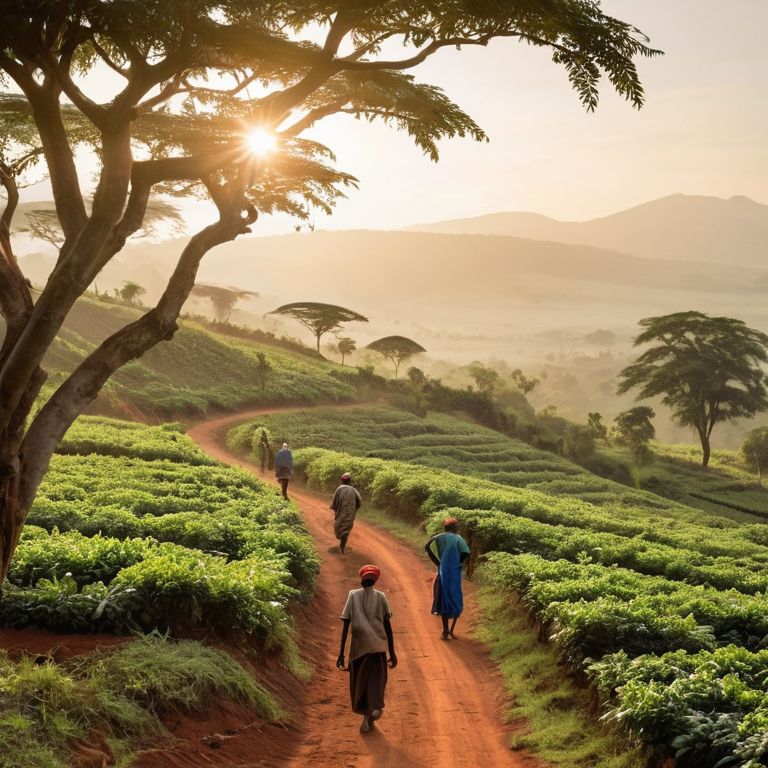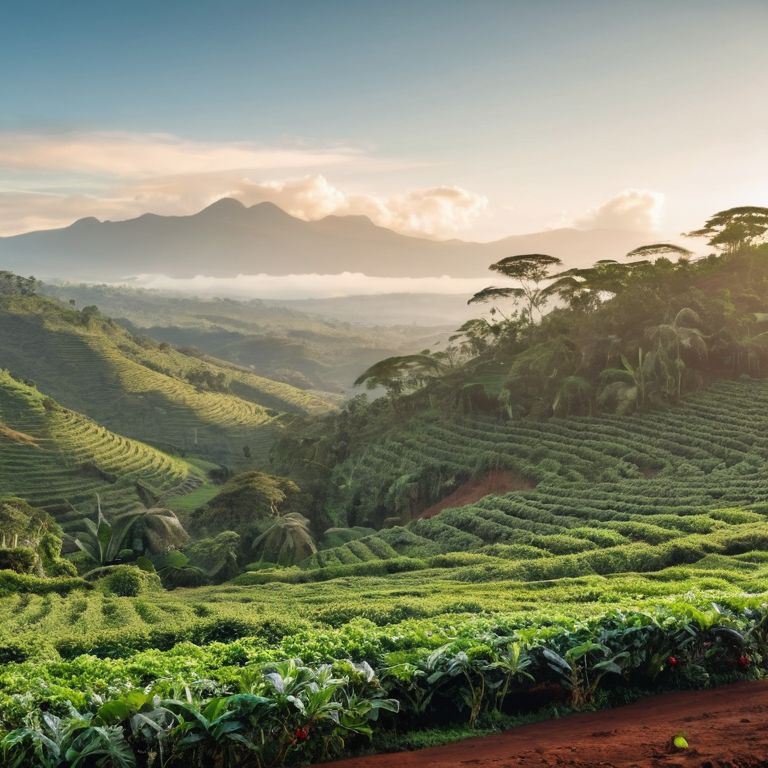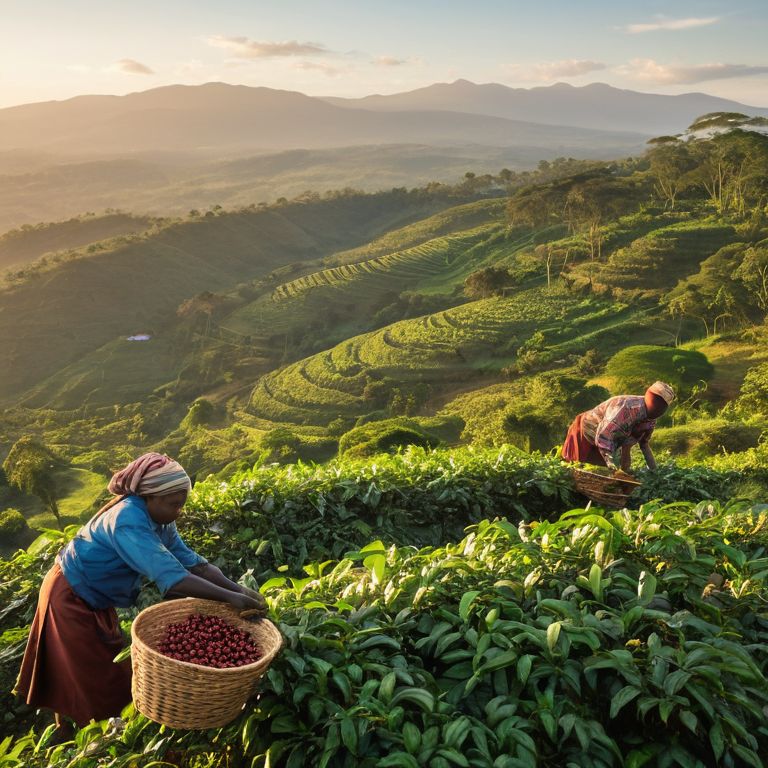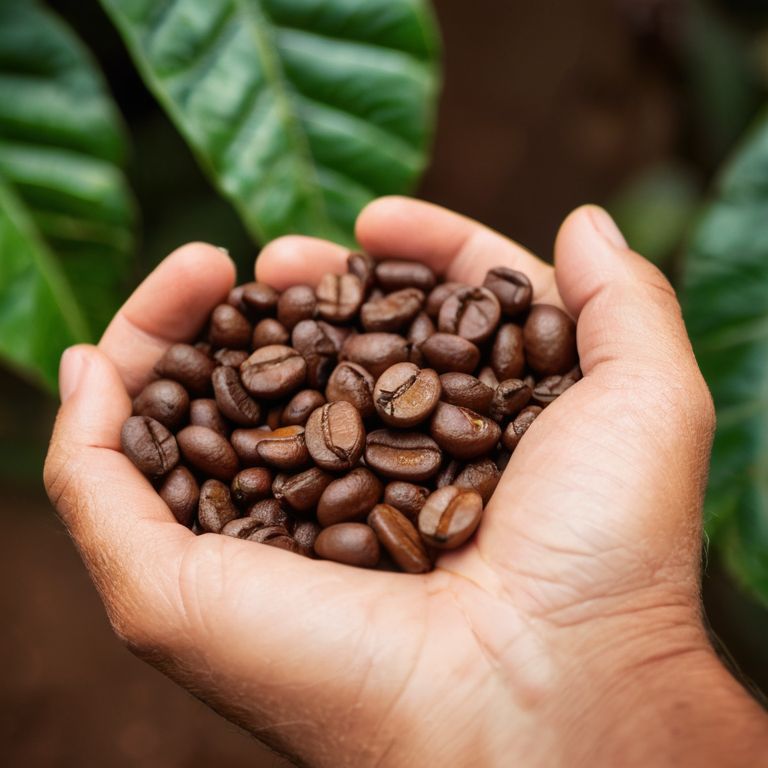As I sit here, surrounded by maps of Kenya’s coffee-growing regions and the faint scent of roasted _cherries_ wafting through the air, I’m reminded of the common misconception that a guide to Kenyan coffee beans is all about listing the best farms or cooperatives. But the truth is, understanding Kenyan coffee is about so much more than that – it’s about grasping the nuances of _terroir_ and how factors like soil acidity and altitude shape the flavor profile of these incredible beans. That’s why I’m excited to share my passion for a guide to Kenyan coffee beans, and help you navigate the complex world of East African coffee.
In this article, I promise to cut through the hype and provide you with _practical advice_ on how to truly appreciate the unique characteristics of Kenyan coffee. From the importance of processing methods to the impact of regional variations on flavor notes, I’ll share my expertise as a head roaster and green coffee buyer to help you make informed decisions when it comes to selecting and brewing the perfect cup. Whether you’re a seasoned coffee enthusiast or just starting to explore the world of specialty coffee, this guide to Kenyan coffee beans is designed to be your trusted companion on a journey to discover the rich flavors and stories behind every cup.
Table of Contents
- Guide Overview: What You'll Need
- Step-by-Step Instructions
- A Guide to Kenyan Coffee Beans
- Unraveling the Secrets of Kenyan Coffee: 5 Essential Tips
- Key Takeaways from Our Journey Through Kenyan Coffee
- Unlocking the Flavors of Kenya
- Embracing the Rich Heritage of Kenyan Coffee
- Frequently Asked Questions
Guide Overview: What You'll Need

Total Time: 2 hours 30 minutes
Estimated Cost: $20 – $40
Difficulty Level: Intermediate
Tools Required
- Coffee Grinder (burr grinder preferred)
- French Press (or other brewing device)
- Scale (for measuring coffee and water)
- Spoon (for stirring)
- Timer (for brewing)
- Storage Container (for storing coffee beans)
Supplies & Materials
- Kenyan Coffee Beans (AA or AB grade)
- Water (filtered or purified)
- Sugar or Sweetener (optional)
- Milk or Creamer (optional)
Step-by-Step Instructions
- 1. First, let’s start by understanding the regional differences in Kenyan coffee beans, as the country is home to several distinct coffee-growing regions, each with its own unique flavor profile. From the bright acidity of beans from the Nyeri region to the balanced flavors of those from Kiambu, knowing the region your beans come from can greatly impact your brewing experience.
- 2. Next, consider the processing method used for the beans, as this can significantly affect the flavor. Kenyan coffee is often processed using the washed method, which helps to bring out the coffee’s bright acidity and complex flavor notes. However, some farms are now experimenting with natural and honey processing methods, offering a sweeter and fruitier taste experience.
- 3. Now, let’s talk about the importance of altitude in Kenyan coffee production. Coffee beans grown at higher altitudes tend to have a slower maturation process, which can result in a more complex flavor profile. Look for beans from farms located in high-altitude areas, such as the Aberdare Mountains or Mount Kenya, for a truly unique taste experience.
- 4. When selecting Kenyan coffee beans, pay attention to the farm or cooperative that produced them. Many Kenyan coffee farms are small, family-owned operations, while others are part of larger cooperatives. Understanding the social and economic impact of your purchase can add a deeper layer of appreciation to your coffee-drinking experience.
- 5. To truly appreciate the flavors of Kenyan coffee, it’s essential to experiment with different roast levels. Lighter roasts will bring out the coffee’s bright acidity and fruit notes, while darker roasts will offer a smoother and more full-bodied taste experience. Don’t be afraid to try different roast levels to find the one that suits your taste preferences.
- 6. Once you’ve selected your Kenyan coffee beans, it’s time to think about brewing methods. Kenyan coffee is well-suited to a variety of brewing methods, from pour-over and French press to Aeropress and espresso. Experiment with different brewing techniques to find the one that brings out the best in your beans.
- 7. Finally, take the time to appreciate the story behind your coffee. From the farmers who carefully cultivated and harvested the beans to the roasters who brought out the unique flavors, every cup of Kenyan coffee has a rich and complex history. By understanding and appreciating this story, you can deepen your connection to the coffee and the people who made it possible.
A Guide to Kenyan Coffee Beans

As I reflect on my journeys to Kenyan coffee farms, I’m reminded of the intricate dance between soil, climate, and processing methods that yields such distinct flavor profiles. The country’s coffee region guide is a testament to its diverse terroir, with each area producing unique notes that are worth exploring. From the blackcurrant and citrus hints in Rift Valley coffees to the wine-like undertones in those from Nyeri, every region tells a story of its people and land.
When it comes to brewing Kenyan coffee, experimentation is key. I’ve found that best brewing techniques involve a balance of temperature, water quality, and coffee-to-water ratio. Whether you prefer a pour-over, French press, or Aeropress, the goal is to bring out the coffee’s inherent brightness and acidity. Pairing Kenyan coffee with blackcurrant, for instance, can elevate the fruit notes and create a delightful harmony of flavors.
For those interested in delving deeper, Kenyan coffee farm tours offer an immersive experience into the world of African coffee culture. By witnessing firsthand the dedication and craftsmanship that goes into cultivating these exceptional beans, one gains a profound appreciation for the journey from farm to cup. It’s an experience that not only enriches one’s understanding of coffee but also fosters a connection with the land and its people.
Exploring Kenyan Coffee Farm Tours
As I reflect on my visits to Kenyan coffee farms, I’m reminded of the vibrant landscapes and warm hospitality. Farm tours offer a unique chance to experience the birthplace of these exceptional beans. I recall walking through the rolling hills of the Nyeri region, surrounded by lush green coffee plants, and learning about the meticulous care that farmers devote to their crops. The opportunity to witness firsthand the processing methods, from washing to drying, is invaluable in understanding the nuances of Kenyan coffee.
By joining a farm tour, you’ll gain a deeper appreciation for the craftsmanship and dedication that goes into producing each cherry. You’ll see the passion and pride of the farmers, and perhaps even get to participate in a traditional coffee ceremony. These experiences not only enrich your understanding of Kenyan coffee but also forge a lasting connection to the people and places behind your cup.
Mastering Best Brewing Techniques
To truly experience the nuances of Kenyan coffee, mastering the best brewing techniques is essential. I’ve found that a pour-over or French press brings out the bright acidity and complex flavor notes that Kenyan cherries are known for. The key is to balance the water temperature and coffee-to-water ratio to avoid overpowering the delicate flavors.
Experimenting with different roasts and brewing methods can also reveal new dimensions in your cup. I recommend starting with a light to medium roast to preserve the coffee’s natural acidity and fruit notes. As you refine your brewing skills, you’ll begin to appreciate the subtle variations that make each Kenyan coffee unique, from the blackcurrant hints of a Kiambu AA to the wine-like undertones of a Nyeri AB.
Unraveling the Secrets of Kenyan Coffee: 5 Essential Tips
- Understand the Impact of Altitude: Kenyan coffee beans are grown at high altitudes, which contributes to their unique flavor profile, with notes of blackcurrant and citrus
- Appreciate the Difference in Processing Methods: Kenyan coffee is typically processed using the washed method, resulting in a brighter acidity and more complex flavor profile compared to naturally processed beans
- Experiment with Roast Levels: Kenyan coffee beans can handle a wide range of roast levels, from light to dark, each bringing out distinct flavors and aromas, so don’t be afraid to try something new
- Pay Attention to Region-Specific Flavor Profiles: Different regions in Kenya, such as Nyeri and Kiambu, produce coffee with distinct flavor profiles, so take the time to explore and find your favorite
- Invest in Fresh, High-Quality Beans: To truly experience the best of Kenyan coffee, invest in fresh, high-quality beans that have been properly stored and handled to preserve their unique flavor and aroma
Key Takeaways from Our Journey Through Kenyan Coffee
I’ve learned that the unique terroir of Kenya, with its rich volcanic soil and high altitudes, contributes to the distinctive bright acidity and complex flavor profiles found in Kenyan coffee beans
Through my experiences with Kenyan coffee farm tours, I’ve come to appreciate the meticulous care and dedication that Kenyan farmers bring to their craft, from carefully hand-picking coffee cherries to meticulously processing them to bring out the full flavor potential
By mastering the best brewing techniques for Kenyan coffee, such as using a pour-over or French press to highlight the coffee’s nuanced flavors, you can truly unlock the full potential of these incredible beans and taste the rich story of Kenya in every cup
Unlocking the Flavors of Kenya
As I reflect on my journeys to Kenya’s coffee highlands, I’m reminded that the true essence of a Kenyan coffee bean lies not just in its bright acidity and complex flavor notes, but in the stories of the people and the land that nurtured it – every sip is a testament to the dedication of the farmers and the rich terroir that gives it life.
Samuel Jones
Embracing the Rich Heritage of Kenyan Coffee

As we conclude our journey through the world of Kenyan coffee beans, it’s essential to reflect on the key factors that make this coffee so unique. From the sun-kissed hills of Africa to the meticulous processing methods, every step of the way contributes to the distinct flavor profile that Kenyan coffee is known for. We’ve explored the best brewing techniques, delved into the benefits of coffee farm tours, and discovered the importance of supporting local farmers. By understanding and appreciating these elements, we can truly elevate our coffee experience and connect with the people and places behind our daily cup.
As we sip our perfectly brewed Kenyan coffee, let’s remember that we’re not just tasting a beverage – we’re experiencing a piece of culture and a story of tradition. The rich flavors and aromas are a testament to the hard work and dedication of the farmers, producers, and roasters who bring this coffee to our tables. So let’s savor the moment, appreciate the journey that each bean has taken, and acknowledge the incredible craftsmanship that goes into creating such an exceptional cup of coffee. In doing so, we’ll not only enjoy our coffee more but also honor the heritage and people behind it.
Frequently Asked Questions
What are the main differences between Kenyan coffee beans grown in various regions, such as Nyeri and Kiambu?
The regional nuances of Kenyan coffee are fascinating. Nyeri’s high-altitude beans tend to be brighter, with citrus notes, while Kiambu’s coffees are often balanced, with hints of blackcurrant and wine. Each region’s distinct terroir shapes the flavor profile, making every cup a unique reflection of its origin.
How do processing methods, like washed versus natural, impact the flavor profile of Kenyan coffee?
The age-old debate: washed versus natural. For Kenyan coffees, I firmly believe the processing method is the key to unlocking their unique flavor profiles. Washed Kenyan coffees tend to be brighter, with notes of citrus and blackcurrant, while natural processed coffees are often sweeter, with hints of stone fruit and a heavier body.
What are some common flavor notes and aromas I can expect to find in a high-quality Kenyan coffee bean?
When you brew a high-quality Kenyan coffee, expect to discover flavor notes of blackcurrant, citrus, and wine, with aromas of sweet floral and citrus hints, all beautifully balanced to reflect the country’s rich terroir and careful processing methods.



